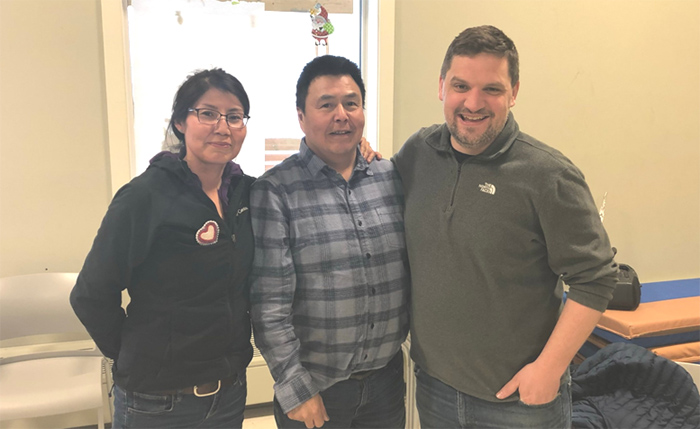 | February 14, 2026
|
|
|

2020/6/3
Laurier researchers partner with northern community to achieve food sovereignty in climate change adaptation
By Suzanne Forcese - Watertoday.ca. Reprinted with permission
Climate Change came knocking at the door of the Ka’a’gee Tu First Nation home of Kakisa during the summer of 2014. All 45 residents of the North West Territories’ smallest community were forced to evacuate for two weeks as the worst wildfire season on record stared at them with the grim face of a new normal.
In a serendipitous event, 2014 was the first year that researchers from Sir Wilfrid Laurier University, under the leadership of Dr. Andrew Spring, came to Kakisa with the intention of bringing social science into climate change by building a network of community priorities.
WaterToday had the pleasure of speaking with Dr. Spring, associate director of the Laurier Centre for Sustainable Food Systems about the value of community-driven and collaborative research with the Ka’a’gee Tu First Nation in Kakisa, NWT.
“We’ve been partners in research and every achievement is something that has a physical presence in the community rather than something we just take away and write in journals and reports. The work shows the benefits of academics working in partnership. But it also pushes a lot of boundaries about what academia can’t and can do.”
Dr. Andrew Spring, Research Director, FLEdGE (Food: Locally Embedded, Globally Engaged)
Known in the local South Slavey dialect as K’agge, meaning “between the willows”, the traditional outpost of Kakisa is situated on the shores of Kakisa Lake. Two hours from the Alberta border, an hour and a half from Hay River and four hours from Yellowknife, the community has traditionally made its living from the waters and surrounding woods --fishing, trapping, hunting, and gathering.
In the new reality however adaptation strategies for food security have become a top priority for many Northern communities.
“Climate change in the North is occurring at a rate that is 3 to 5 times faster than the rest of Canada. Here in southern Ontario we complain about the hot weather and the need for air conditioning, but in the North it’s really fundamentally changing ecosystems,” Spring told WT.
Northern communities have been coping with food security challenges for many years, including the legacies of colonialism, and the transitional impacts from the traditional food system to increased dependence on over-priced and nutritionally deficient store bought food.
“Climate change is just one more stressor contributing to food insecurity in a situation that’s already precarious.”
For Spring and his team of students, the first pillar of research is building and strengthening relationships. “Working with the community has been a wonderful experience where we support each other and make sure that the products of our research are tangible and visible in the community.” Community gardens, an online tool to track changes in landscape, and a community-run recycling program -- the only one of its kind in the NWT -- are just a few examples.
The relationship with Kakisa started in 2014 when the community was looking for support in dealing with climate change adaptation. “Living with climate change right there on their doorstep, it was a really a good way to start our engagement.”
“We started asking how is climate change affecting you and what do you want to do about it?”
“Kakisa was adamant about four things. They said, ‘We want you to engage our youth in all aspects of the research, we want to map and monitor the land, we want to recycle and we want to grow food’. There are health benefits to fresh, locally produced food and the community wants to capitalize on those.”
Spring speaks fondly of the working partnership and friendship he shares with Chief Lloyd Chicot who plays an important role both in research and in helping to foster community engagement; and Melaine Simba, who is the environmental coordinator. “They are the real champions,” Spring says of their creative ideas. “For us the work is driven by our relationships. There is always that person on the ground that makes all the difference.”

Melaine Simba, Chief Lloyd Chicot, Dr. Andrew Spring - Photo Courtesy FLEdGE
“Our work together is about restoring power to the community and giving them a voice to achieve their goals. We have an ongoing dialogue to discuss opportunities and issues as they arise. All this work together has allowed us to foster great partnerships. We feel like family. My role as a partner is to bring resources to the table that they can access.”
It has been increasingly more difficult to subsist on the traditional diet. The fires destroyed trails and animals are roaming elsewhere. Travel on land is becoming more dangerous due to unpredictable weather. There is no snow where there once was, creating trapping difficulties. The water is warmer, making it a necessity to check fishing nets twice daily to avoid a spoiled catch. New species are showing up. Pelicans for instance, which are feeding on the fish supply.
As a result of food insecurity, the community had expressed a need to grow their own food. “We very quickly got the cash together to build garden boxes and have the entire community from the youngest to the oldest involved in gardening.”
Spring admits there are still some kinks to be ironed out. “Gardening is not a part of their traditional history. A lot of residual negativity still exists associated with missionaries and residential schools trying to introduce gardening.” Then there is the issue of crops. “Kale grows really well – but no one is eating it. Potatoes and root vegetables seem to be a favorite and pair well with traditional foods.”
Also there is the issue of soil quality. Land is subsiding due to earlier permafrost melt and water leaving the system. There is a need to supplement with nutrients. “We have started fish composting.”
A greenhouse will be built this summer to increase the length of the growing season.
What does agriculture look like in the North? “We are exploring the value of the boreal forest. Traditionally the forest was a source of hunting and gathering but climate change and the fires have created a different landscape so now we are looking at using an agricultural approach in the forest.”
Chief Chicot and Spring journeyed to Brazil to learn how the forest has been regenerated by planting yerba matte. “We are looking at doing something similar here. Of course we can’t chop down the forest but we can look at ways to build resilience. We are thinking outside the box and trying to use fire breaks as agricultural land.
“We want to use agriculture not only as an adaptation tool but as a mitigation tool. We want to do agriculture in a way that stores carbon, that works with the forest. It’s an approach called agroforestry or agroecology, which is all about taking care of the land, animals and people. It also fits in well with Indigenous food systems.”
Protecting the land also means protecting the food system. That includes waste management and recycling which are two more spin-off programs.
Developed by the community and student researchers using ArcGIS technology, the LT Atlas project is also highlighted. Combining traditional and scientific knowledge, community members can better adapt to changing conditions on land. Information that is critical to harvester safety.
“The story really isn’t about the negative impacts of climate change,” Spring adds. “The story is about what Kakisa and other communities across the North are doing to adapt their food systems.”
“Adaptation starts with knowledge. Adaptation starts with the Youth.”
On-the-Land Camps have been created where the youth become involved with the land and learn Traditional skills from the Elders. As part of the research taking place, Laurier research students also participate in the camps to learn to fish, traditional activities, and to discuss climate change.
“If those kids can learn from the students and the students can learn from us and the kids, then you know we’ve reached one other person that can look at the whole climate change and land thing differently. That’s the goal of the Elders.”
--Chief Lloyd Chicot
Food sovereignty and climate change adaptation achieved through cultivating relationships-- Dr. Andrew Spring’s winning model is an example to be replicated.
suzanne.f@watertoday.ca
|
|
|